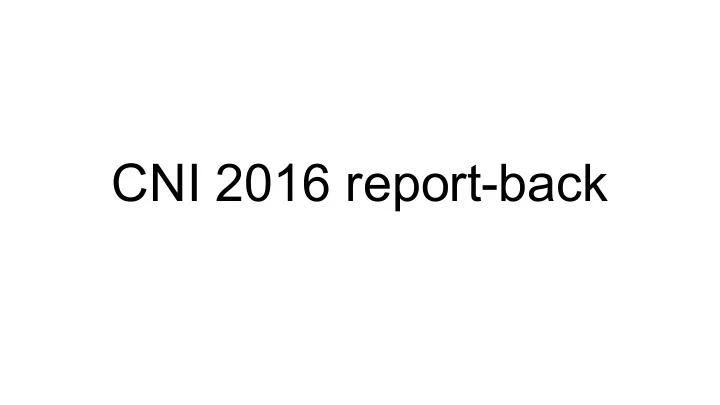

CNI 2016 report-back
ECAR/CNI white paper on developing capacity for institutional digital humanities support ● Practical guide ● Capacity-building framework ● “Digital humanities” vs “digital scholarship” ● “Services” vs “partnerships”
ECAR/CNI white paper on developing capacity for institutional digital humanities support ● Getting started ● Infrastructure ○ Needs assessment ○ Technology ○ Organizational models ○ Staffing ● Community engagement ○ Facilities ● Communications and outreach ● Acceptance and support (P&T) ● Funding models ● Governance
Cliff Lynch plenary ● Uptake of preprint servers ● Discipline-oriented repositories are more effective for community building ● Bringing museum collections to teaching and research ● Recording and archiving algorithms (e.g. Google search)
Building Tools and Services to Support Research Software Preservation and Sharing Micah Altman, MIT Jeffrey Spies, Open Science Rick Johnson, ARL / Univ. of Notre Dame Fernando Rios, Johns Hopkins ● Open Science Framework: managing, curating, sharing, and preserving research workflow
Building Tools and Services to Support Research Software Preservation and Sharing ● Software not showing up in institutional repositories ● Lack of progress compared to data ● Force 11 has software citation principles ● Incentives are around publishing, not getting it right ○ Need context for reproducibility, replicability, extensibility ○ Researchers not interested in managing “code”, don’t want to be “coders” ● Preservation environment connected directly to compute environment to archive code
Research IT @ Illinois: Establishing Service Responsive to Investigator Needs John Towns, Deputy CIO for Research IT, Univ. of Illinois ● “Year of Cyberinfrastructure” initiative ○ Create common understanding of resources as part of CI ○ Highlight how CI supports research ○ Implementation plan for more CI ● 27 focus groups, 130 faculty, 12/14 colleges, 155 p. notes, only 5% faculty ● Key findings: ○ 1) Access to expertise ○ 2) Communications (“I need X.” “We already have X.” “Never heard of it. Is it what I need?”) ○ 3) Data needs ○ 4) Tech needs (storage issues, software licensing, access to survey tools, etc.)
Research IT @ Illinois: Establishing Service Responsive to Investigator Needs ● Planned for bold investment in research, then funding didn’t come through ● RIT support ○ Training ○ Communications / marketing ○ RIT portal ○ Research user support ○ Research apps & software development ○ Data viz & analysis service ● Research computing ○ ScienceDMZ ○ IL campus cluster program ○ High throughput computing ○ VM and containers for research ○ Cloud computing for research
Research IT @ Illinois: Establishing Service Responsive to Investigator Needs ● Data Services ○ Sensitive data ○ REDCap ○ HIPAA compliant ● RIT strategy ○ Needs collection ○ CI master plan ○ UIUC IT architecture ● Deferred ○ Mapping (Hadoop, Mpreduce) ○ Data intensive computing ○ Social media lab ○ DB as a service ○ Grant proposal support service ○ Allocations service (unified allocations process for RIT resources and services)
Research IT @ Illinois: Establishing Service Responsive to Investigator Needs ● Data Services ○ Sensitive data ○ REDCap ○ HIPAA compliant ● RIT strategy ○ Needs collection ○ CI master plan ○ UIUC IT architecture ● Deferred ○ Mapping (Hadoop, Mpreduce) ○ Data intensive computing ○ Social media lab ○ DB as a service ○ Grant proposal support service ○ Allocations service (unified allocations process for RIT resources and services)
Expanding Research Data Services Michelle Claibourn, UVirginia Bryan Sinclair, Georgia State ● Georgia State ○ Established data management advisory team in 2012-2013 ■ Business in DMP less robust now ○ Faculty & students say Excel for biggest training need ○ Gaps in support of the actual research phases ■ Drop-in hours for SPSS help ■ Outreach to courses on relevant methods ○ Partnership with VP for Research Office ■ OSF for long-term preservation, meeting with research computing ■ Outreach for help with proposals about restricted data ○ Expanded program is 4 months old, emphasis on communications
Expanding Research Data Services Michelle Claibourn, UVirginia Bryan Sinclair, Georgia State ● UVirginia ○ Primary activity: direct engagement w/ researchers, consultation, collaboration ■ 1800 consultations in first 3 years, 60% data analysis wrangling & statistics ■ 375 more consultations from this fall ■ 800 researchers, 45% met with multiple people, repeatedly ■ 45% grad students, targeted that community explicitly ■ 90 workshops in first 3 years ○ Lots of recent changes, more support for data-oriented research
Expanding Research Data Services
Expanding Research Data Services
Documenting the Now http://app.docnow.io ● Affordances for ethical practice ● Notifications into tweet stream “Researcher X is doing data collection for Y reason, go here to opt out.” ● Twitter API requirements: store only tweet IDs for later rehydration ● Data retention policies ● Traditional knowledge labels (inspired by Mukurtu)
Disciplinary repositories John Howard, Univ. College Dublin Francis McManamon, ASU ● Consortium of European Social Science Data Archives (CESSDA) ○ Take-away point: easier access to European data sets ● The Digital Archaeological Record (tDAR) ○ Based out of ASU ○ Numerous large government contracts ○ Has per-item fee, meant to cover long-term preservation ■ “Item” = up to 10 MB ○ More focused on archiving than Open Context, better metadata templates
Recommend
More recommend